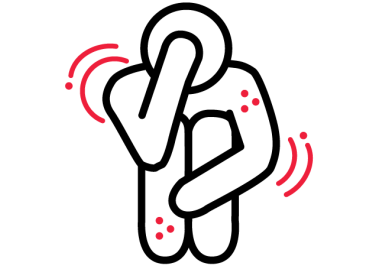What if an Itch Never Stopped?
What if an Itch Never Stopped?
You have been itchy before, right?
Maybe it was a mosquito bite, or a wool sweater, or a case of poison ivy. Point being, we have all experienced itch before and we all have the same response to itch. We scratch our skin until the itch goes away. Fortunately for most of us, itch is a temporary interruption, and we go back to our daily lives.
Now imagine the itch from that mosquito bite, wool sweater, or poison ivy doesn’t go away no matter how much you scratch. Imagine that the itch gets more intense over time and becomes constant, making it difficult to sleep, spend time with family or friends, go to work, or attend school. What would your skin look like if you couldn’t stop scratching?
For patients with chronic skin diseases such as prurigo nodularis (PN) and atopic dermatitis (AD), itch can be constant, intractable, and debilitating. It can be an itch that never goes away, making it difficult to have relationships, sleep, and perform basic daily activities. Patients with AD and PN may even develop anxiety or depression, because no matter how much they scratch, the itch just won’t go away.1,2,3,4,5
This series of short articles will explore many dimensions of chronic itch in AD and PN, the pathophysiology of itch, and the emerging science around IL-31, a key neuroimmune cytokine that can drive itch through multiple mechanisms. At the end of the series, you will have the chance to test your “itch knowledge.”
Click on the next article in the series where we will start with a complex question: What exactly is itch?
GL-NAD-2300033
References:
1. Steinke S, Zeidler C, Riepe C, et al. Humanistic burden of chronic pruritus in patients with inflammatory dermatoses: Results of the European Academy of Dermatology and Venereology Network on Assessment of Severity and Burden of Pruritus (PruNet) cross-sectional trial. J Am Acad Dermatol. 2018;79(3):457-463.e5. doi: 10.1016/j.jaad.2018.04.044
2. McCleary KK. More than skin deep. 2020. http://www.morethanskindeep-eczema.org/uploads/1/2/5/3/125377765/mtsd_report_-_digital_file.pdf
3. Pereira MP, Basta S, Moore J, Ständer S. Prurigo nodularis: a physician survey to evaluate current perceptions of its classification, clinical experience and unmet need. J Eur Acad Dermatol. 2018;32(12):2224-2229. doi: 10.1111/jdv.15107.
4. Silverberg JI. Comorbidities and the impact of atopic dermatitis. Ann Allergy Asthma Immunol. 2019;123(2):144-151. doi: 10.1016/j.anai.2019.04.020.
5. Konda D, Chandrashekar L, Rajappa M, et al. Serotonin and interleukin-6: Association with pruritus severity, sleep quality and depression severity in Prurigo Nodularis. Asian J Psych. 2015;17:24-8. doi: 10.1016/j.ajp.2015.07.010.
